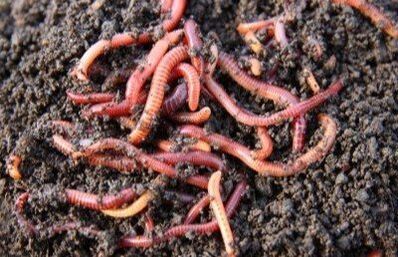Get a wriggle on and do your garden lots of good.

A healthy worm population is essential for a healthy garden.
Worms play an important part in soil construction and recycling of organic waste. They are a part of a network of organisms that turn refuse into nutrient rich soil.
Earthworms help create humus—a dark brown-black type of soil which holds important nutrients in place for plant growth and use. Earthworms also help create good soil structure; their burrows open up the soil and create aeration and drainage channels.
Earthworm castings or excrement are rich in nitrogen, phosphorous and potassium, the key minerals needed for plant growth. Earthworm castings also help bind calcium, iron, and sulfur to soil particles—minerals that also help plants thrive. Adding chopped leaves, grass clippings, semi-rotted compost and animal manure to your garden will encourage earthworms to take up residence, be active, and thrive.
Benefits of Earthworms in the Garden
Worms tunnel in soil and eat organic matter, which they excrete as castings. Worms abound in soils that are around 70 degrees Fahrenheit (21 C.). Any extremes of cold, heat or moisture are not good for worm activity. Worms in gardens are most active when soil is moderately warm and moist.
• Earthworms burrow through the soil creating channels for oxygen and aerobic bacteria to get into plant roots..
• Earthworms create tunnels that allow rain and irrigation water to penetrate the soil.
• Earthworms break up hardpan—dense soil that is inhospitable to plant roots. Earthworms can burrow to as deep as 6 feet in the soil.
• Earthworms leave behind excrement or castings containing from 5 to 11 times the amount of nitrogen, phosphorus, and potassium they have ingested.
• When earthworms die their protein-rich bodies return nitrogen fertilizer to the soil.
• Earthworm digestive juices enrich the soil.
Worms play an important part in soil construction and recycling of organic waste. They are a part of a network of organisms that turn refuse into nutrient rich soil.
Earthworms help create humus—a dark brown-black type of soil which holds important nutrients in place for plant growth and use. Earthworms also help create good soil structure; their burrows open up the soil and create aeration and drainage channels.
Earthworm castings or excrement are rich in nitrogen, phosphorous and potassium, the key minerals needed for plant growth. Earthworm castings also help bind calcium, iron, and sulfur to soil particles—minerals that also help plants thrive. Adding chopped leaves, grass clippings, semi-rotted compost and animal manure to your garden will encourage earthworms to take up residence, be active, and thrive.
Benefits of Earthworms in the Garden
Worms tunnel in soil and eat organic matter, which they excrete as castings. Worms abound in soils that are around 70 degrees Fahrenheit (21 C.). Any extremes of cold, heat or moisture are not good for worm activity. Worms in gardens are most active when soil is moderately warm and moist.
• Earthworms burrow through the soil creating channels for oxygen and aerobic bacteria to get into plant roots..
• Earthworms create tunnels that allow rain and irrigation water to penetrate the soil.
• Earthworms break up hardpan—dense soil that is inhospitable to plant roots. Earthworms can burrow to as deep as 6 feet in the soil.
• Earthworms leave behind excrement or castings containing from 5 to 11 times the amount of nitrogen, phosphorus, and potassium they have ingested.
• When earthworms die their protein-rich bodies return nitrogen fertilizer to the soil.
• Earthworm digestive juices enrich the soil.
What Earthworms Do
Earthworms eat dead leaves and grass, rotting plants, animal manure, semi-rotted compost and bits of soil; organic matter is ground in their gizzards, mixed with digestive juices and enzymes in the stomach then returned to the soil. Earthworms remove surface debris and fungal spores from the garden; they clean the garden of unwanted organic materials.
These amazing creatures eat their own weight in organic matter and soil each day. A pound of earthworms will eat a pound of organic matter and soil each day. Their coil-like castings are stable when both wet and dry thus improving soil structure.
Earthworms reproduce quickly and increase their population exponentially; one breeding earthworm can produce 96 new baby worms in six months.
Earthworms eat dead leaves and grass, rotting plants, animal manure, semi-rotted compost and bits of soil; organic matter is ground in their gizzards, mixed with digestive juices and enzymes in the stomach then returned to the soil. Earthworms remove surface debris and fungal spores from the garden; they clean the garden of unwanted organic materials.
These amazing creatures eat their own weight in organic matter and soil each day. A pound of earthworms will eat a pound of organic matter and soil each day. Their coil-like castings are stable when both wet and dry thus improving soil structure.
Earthworms reproduce quickly and increase their population exponentially; one breeding earthworm can produce 96 new baby worms in six months.
Encouraging Earthworms in Soil
Avoid deep tilling to prevent damage to permanent earthworm burrows. “Feed” your worms by providing layers of organic munchies for them to eat. These might be grass clippings, leaf litter or other natural compostable items. Do not use pesticides, which can kill entire populations of worms in gardens. You can also transplant a couple of shovels full of soil laden with worms to areas with few of the organisms. They will soon populate the soil. Worm eggs are also available at some nurseries and online. Vermicomposting will also encourage these beneficial creatures to the garden.
Avoid deep tilling to prevent damage to permanent earthworm burrows. “Feed” your worms by providing layers of organic munchies for them to eat. These might be grass clippings, leaf litter or other natural compostable items. Do not use pesticides, which can kill entire populations of worms in gardens. You can also transplant a couple of shovels full of soil laden with worms to areas with few of the organisms. They will soon populate the soil. Worm eggs are also available at some nurseries and online. Vermicomposting will also encourage these beneficial creatures to the garden.
Worm Composting
You can use these recycling abilities on your kitchen scraps. Red wigglers and redworms are the organisms of choice for worm composting, also known as vermicomposting, which is done in a bin. Earthworms aren’t a good choice – they are diggers and will try to get out. Placid red wigglers will turn your kitchen scraps into compost quickly and also provide compost tea for plants that need extra babying. Line a bin with newspaper or shredded organic material and layer in good quality compost. Add finely cut kitchen scraps, add worms, and cover with a light dusting of soil. Keep the compost lightly moist and put a lid on with air holes punched in for the worms. As they compost the scraps, scrape finished product to one side and add more. This small set up provides similar earthworm benefits, but on a small scale.
You can use these recycling abilities on your kitchen scraps. Red wigglers and redworms are the organisms of choice for worm composting, also known as vermicomposting, which is done in a bin. Earthworms aren’t a good choice – they are diggers and will try to get out. Placid red wigglers will turn your kitchen scraps into compost quickly and also provide compost tea for plants that need extra babying. Line a bin with newspaper or shredded organic material and layer in good quality compost. Add finely cut kitchen scraps, add worms, and cover with a light dusting of soil. Keep the compost lightly moist and put a lid on with air holes punched in for the worms. As they compost the scraps, scrape finished product to one side and add more. This small set up provides similar earthworm benefits, but on a small scale.
